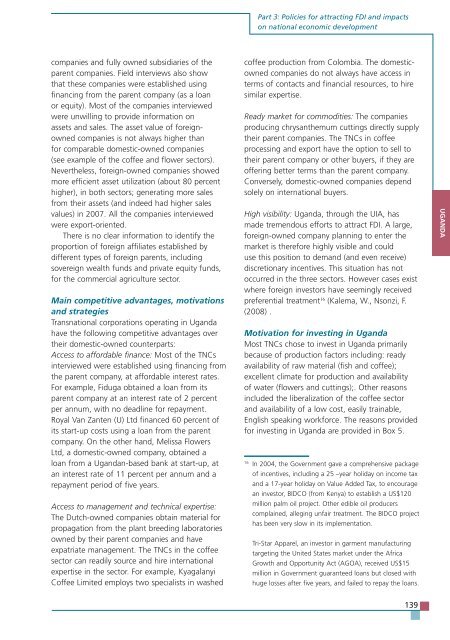TRENDS AND IMPACTS OF FOREIGN INVESTMENT IN DEVELOPING COUNTRY AGRICULTURE
TRENDS AND IMPACTS OF FOREIGN INVESTMENT IN DEVELOPING COUNTRY AGRICULTURE
TRENDS AND IMPACTS OF FOREIGN INVESTMENT IN DEVELOPING COUNTRY AGRICULTURE
You also want an ePaper? Increase the reach of your titles
YUMPU automatically turns print PDFs into web optimized ePapers that Google loves.
companies and fully owned subsidiaries of the<br />
parent companies. Field interviews also show<br />
that these companies were established using<br />
financing from the parent company (as a loan<br />
or equity). Most of the companies interviewed<br />
were unwilling to provide information on<br />
assets and sales. The asset value of foreignowned<br />
companies is not always higher than<br />
for comparable domestic-owned companies<br />
(see example of the coffee and flower sectors).<br />
Nevertheless, foreign-owned companies showed<br />
more efficient asset utilization (about 80 percent<br />
higher), in both sectors; generating more sales<br />
from their assets (and indeed had higher sales<br />
values) in 2007. All the companies interviewed<br />
were export-oriented.<br />
There is no clear information to identify the<br />
proportion of foreign affiliates established by<br />
different types of foreign parents, including<br />
sovereign wealth funds and private equity funds,<br />
for the commercial agriculture sector.<br />
Main competitive advantages, motivations<br />
and strategies<br />
Transnational corporations operating in Uganda<br />
have the following competitive advantages over<br />
their domestic-owned counterparts:<br />
Access to affordable finance: Most of the TNCs<br />
interviewed were established using financing from<br />
the parent company, at affordable interest rates.<br />
For example, Fiduga obtained a loan from its<br />
parent company at an interest rate of 2 percent<br />
per annum, with no deadline for repayment.<br />
Royal Van Zanten (U) Ltd financed 60 percent of<br />
its start-up costs using a loan from the parent<br />
company. On the other hand, Melissa Flowers<br />
Ltd, a domestic-owned company, obtained a<br />
loan from a Ugandan-based bank at start-up, at<br />
an interest rate of 11 percent per annum and a<br />
repayment period of five years.<br />
Access to management and technical expertise:<br />
The Dutch-owned companies obtain material for<br />
propagation from the plant breeding laboratories<br />
owned by their parent companies and have<br />
expatriate management. The TNCs in the coffee<br />
sector can readily source and hire international<br />
expertise in the sector. For example, Kyagalanyi<br />
Coffee Limited employs two specialists in washed<br />
Part 3: Policies for attracting FDI and impacts<br />
on national economic development<br />
coffee production from Colombia. The domesticowned<br />
companies do not always have access in<br />
terms of contacts and financial resources, to hire<br />
similar expertise.<br />
Ready market for commodities: The companies<br />
producing chrysanthemum cuttings directly supply<br />
their parent companies. The TNCs in coffee<br />
processing and export have the option to sell to<br />
their parent company or other buyers, if they are<br />
offering better terms than the parent company.<br />
Conversely, domestic-owned companies depend<br />
solely on international buyers.<br />
High visibility: Uganda, through the UIA, has<br />
made tremendous efforts to attract FDI. A large,<br />
foreign-owned company planning to enter the<br />
market is therefore highly visible and could<br />
use this position to demand (and even receive)<br />
discretionary incentives. This situation has not<br />
occurred in the three sectors. However cases exist<br />
where foreign investors have seemingly received<br />
preferential treatment 16 (Kalema, W., Nsonzi, F.<br />
(2008) .<br />
Motivation for investing in Uganda<br />
Most TNCs chose to invest in Uganda primarily<br />
because of production factors including: ready<br />
availability of raw material (fish and coffee);<br />
excellent climate for production and availability<br />
of water (flowers and cuttings);. Other reasons<br />
included the liberalization of the coffee sector<br />
and availability of a low cost, easily trainable,<br />
English speaking workforce. The reasons provided<br />
for investing in Uganda are provided in Box 5.<br />
16 In 2004, the Government gave a comprehensive package<br />
of incentives, including a 25 –year holiday on income tax<br />
and a 17-year holiday on Value Added Tax, to encourage<br />
an investor, BIDCO (from Kenya) to establish a US$120<br />
million palm oil project. Other edible oil producers<br />
complained, alleging unfair treatment. The BIDCO project<br />
has been very slow in its implementation.<br />
Tri-Star Apparel, an investor in garment manufacturing<br />
targeting the United States market under the Africa<br />
Growth and Opportunity Act (AGOA), received US$15<br />
million in Government guaranteed loans but closed with<br />
huge losses after five years, and failed to repay the loans.<br />
139<br />
UG<strong>AND</strong>A


